The December 2025 Durham Friends Meeting Newsletter is HERE.
Durham Friends Woman’s Society Meeting Minutes, November 17, 2025
Durham Friends Woman’s Society Meeting Minutes 11.17.2025
Hybrid Meeting held at Nancy Marstaller’s Home
Present: Dorothy Curtis, Nancy Marstaller, Susan Gilbert, Dorothy Hinshaw, Martha Sheldon. On Zoom: Joyce Gibson
Cards: For Maureen and Cush Anthony.
Program and Devotions: We took turns reading from the new Blueprints, “Love in Many Languages”: Lesson 3 “A Love That Has No Boundaries” by Zelika Galavu. James 2:16, Action through love speaks louder than mere words. Turkana people of north east Kenya have herds of goats and camels that feed on thorny shrubs. The local people are affected by drought causing different tribal members to steal animals. We discussed God teaching us the way to do things for others. The author has been blessed in her life and has created an environment which encourages others to share. She finds it amazing how different small groups in the world have reached out and made a difference to people in need, and is grateful for the people from Lawrence, USA for their support of the Turkana people. words. Dorothy Hinshaw will research in what state Lawrence is in the USA.
Treasurer’s Report: Nancy told us that the total proceeds from Dorothy Curtis’ jam sales came to $311.75, and it was sent to LACO. This months income was $10. Membership, $5. Blueprints and a $20. donation. Dorothy bought 8 tablecloths; from the money set aside for the purpose, and $45. remains. We have a $100.20 balance, and will decide how to donate that at a future meeting.
Minutes: Susan read her 10.20.’25 Minutes.
Tedford Meal: The Nov. 3 Tedford meal was ham. The Dec.1 Tedford meal Team A leader is Kim Bolshaw, (207)808-3007. Durham Friends provide dinner for Tedford House on the first Monday of each month. Contributions of prepared food or money for Tedford meals are always welcome.
Next Meeting: Dec.15 is our annual Christmas meeting and party which will be held at Dorothy Curtis’ home. Please bring a gift to exchange. All are welcome!
Other Business: There is news that people are starting to move into the new Tedford Housing facility. Starting in January we will be delivering meals there and starting in February we will need to cook for more people- 24. The Woman’s Society Silent Auction ends November 30. It benefits Tedford House and Warm Thy Neighbor. Quilt squares are out for Craig’s daughter’s baby. Tess’s daughter in law Lauren had a baby girl and Dorothy made her a quilt.
Dorothy closed the meeting with a poem:
THANK GOD FOR LITTLE THINGS
Thank you God, for little things
That often come our way,
The things we take for granted
But don’t mention when we pray,
The unexpected courtesy.
The thoughtful, kindly deed,
A hand reach out to help us
In the time of sudden need-
Oh make us more aware, dear God,
Of little daily graces
That come to us with “sweet surprise”
from never-dreamed-of places.
— Helen Steiner Rice
Respectfully Submitted, Susan Gilbert
Edwin Hinshaw, 1934-2025
Edwin Hinshaw departed from this life November 27, 2025, peacefully in his sleep, with family members present.
Ed was born in 1934 in Winchester, Indiana. After they both graduated from Earlham College, he married Dorothy Ellen Stratton in 1955. Together with Dot, he worked in various ministries in Indiana, Maine, Kenya, Iowa and Maryland. He retired after many years as Head of Sandy Spring Friends School in Maryland, and thereafter lived in Maine, a beloved member of Durham Friends Meeting.
Memorial Service 11:00 am, January 10, 2026 at Durham Friends Meeting.
Edwin Hinshaw Obituary
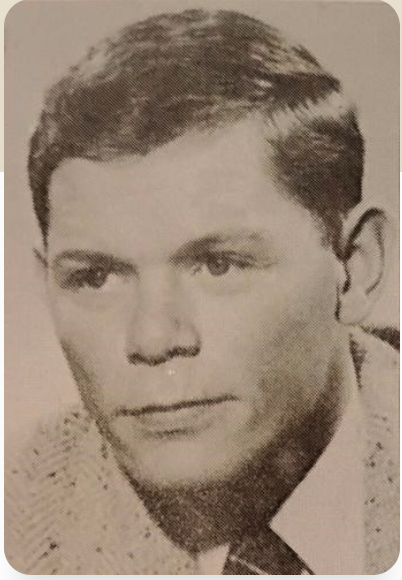
Obituary published on Legacy.com by Direct Cremation of Maine – Belfast on Dec. 5, 2025.
Edwin Everett Hinshaw passed away peacefully at age 91 November 27, 2025 at Schooner Memory Care in Auburn Maine. He was born August 16, 1934 in Winchester, Indiana, just across the street from where he grew up as eldest of three boys to Everett and Clara Cook Hinshaw. In elementary school he was mostly ornery, until grade six when he went to work delivering the Palladium Item newspaper which he did for six years quitting upon graduating. He was active with family at Jericho Friends Meeting, always thinking of himself as a “Jericho boy”. He played football under Coach Vincent Gunther, was elected class president three of the four years and much to his surprise received the American Legion Scholarship and Leadership Award and the School’s Best All Round Student Award at graduation.
Earlham College opened the world to him, where he met his wife, Dorothy Strattan, a life long partner and best friend for 70 years, and graduated with a degree in Mathematics and a license to teach. Ed and Dorothy were youth ministers at West Richmond Friends Meeting while in college. Following college he was the minister at Williamsburg Friends Meeting for a year then he and Dorothy received the Friends World Committee for Consultation’s Quaker Leadership Grant which enabled them to attend Woodbrooke College in Birmingham, England prior to going to Kenya, East Africa where he taught math and science at Kaimosi Teacher Training College, and served as Youth Leadership Development Secretary for East Africa Yearly Meeting.
Returning to the States in 1962 with four children: Lindley born in Richmond, Indiana, Martha born in England, Jenny and Joel born in Kenya, Ed attended Boston University School of Theology and Boston University earning a Bachelor’s Degree in Sacred Theology and a Master’s Degree in Religious Education and Human Relations. He served as pastor of Westport Friends Meeting, Massachusetts and became the first person to be employed by a Yearly Meeting as New England Yearly Meeting’s Youth and Education Secretary. He also directed Friends China Camp in Maine for several summers. In 1972 the family moved to Maine where Ed served as Chaplain at University of Maine, Orono and Director of Maine Christian Association Center. Moving to Iowa for a few years he taught Educational Psychology and Human Relations at William Penn College. Ed and his family moved to Maryland where he served as Headmaster of Sandy Spring Friends School, Maryland for 12 years. Over the years Ed served as a delegate to Friends United Meeting, Friends General Conference, Friends World Committee for Consultation, Earlham School of Religion Board of Advisors, and New England Yearly Meeting.
Dorothy and Ed have lived in Maine since retirement, calling themselves “local Friends”. During their time in Maine they were active skiers and volunteer instructors for over 20 years with Maine Adaptive Sports and Recreation, treasurer of Sunday River Christian Ministry, and served on Sumner Town Committees. Ed also was an “intense” genealogist, loved working outdoors and re-siding the barn; climbing to the peak at age 75.
Ed was a beloved and active member of Durham Friends Meeting in Maine. His favorite Bible passages were Micah 6:8, Amos 5:24 and Matthew 5. He believed youth and all persons should be examples of good will and awe; each person being their own beatitude.
Ed is survived by his wife, Dorothy; brothers, Merril Hinshaw (Janis) from French Lick Indiana, Ronald Hinshaw (Linda) from Tipton Indiana; children, Lindley Hinshaw (Diana) from Basin Wyoming, Martha Hinshaw Sheldon from Northern Ireland, Jenny Hinshaw (Daniel Rhinehart) from Rockville Maryland, Joel Hinshaw (Rachel Rousseau) from Freeport Maine; grandchildren Kyle Hinshaw (Caitlyn) from Sheridan Wyoming, Chris Sheldon from Inverness Scotland, Jess Sheldon from Coleraine Northern Ireland, Sean Rhinehart (Grace Montgomery) from Brooklyn New York, Ryan Petherbridge from Portland Maine, Owen Petherbridge from Breckenridge Colorado; great grandchildren Atley, Emerie, and Saylor Hinshaw from Sheridan Wyoming. He is predeceased by his son-in-law Robert Sheldon.
A memorial service will be held at Durham Friends Meeting January 10 at 11:00 am – 532 Quaker Meeting House Road, Durham. Another service will be held at Jericho Friends Meeting in Winchester Indiana in April – time to be determined.
In lieu of flowers send contributions to Maine Adaptive Sports and Recreation. maineadaptive.org/ways-to-give/
Durham Friends Meeting Minutes, November 16, 2025
Durham Monthly Meeting of Friends Business Meeting Minutes, November 16, 2025
Ellen Bennett — Recording Clerk
Durham Monthly Meeting of Friends met for the conduct of business on Sunday, November 16, 2025, with eleven people in attendance at the Meetinghouse.
1. Meeting Opening
Clerk opened with the following poem:
From "Many Winters" by Nancy Wood
Now this is what we believe.
The mother of us all is the earth.
The father is the sun.
The Grandfather is the Creator
Who bathed us with his mind
And gave life to all things.
The Brother is the beasts and trees.
The Sister is that with wings.
We are the Children of Earth
And do it no harm in any way.
Nor do we offend the sun
By not greeting it at dawn.
We praise our Grandfather for his creation.
We share the same breath together--
The beasts, the trees, the birds, the man.
2. Approval of Minutes of October 2025
date corrected.
3. Ministry and Counsel — Renee Cote
Please see report.
Diana White’s memorial minute was read aloud.
Great appreciation was expressed for those who serve as our Zoom technicians.
Meeting members, Cush and Maureen Anthony, are downsizing. An initial offer/suggestion was made by Maureen to donate the household items for a rummage sale, the proceeds from which would go to the Meeting. Meeting members feel that we may not have the capacity to handle
such an event. A solution might be to donate the items to Furniture Friends in Portland, an organization established by Cush Anthony.
Recording clerk will check to see if the Christmas candlelight service will take place again this year.
4. Finance Committee Report — Doug Bennett
Please see reports: Third 3rd quarter income and expenses, and proposed 2026 budget.
Headline for 3rd quarter: the Meeting is in good financial shape. Income covers expenses. Electricity expenses are up, likely due to the move to heat pumps, and the overall increase in costs of this utility.
There are few changes in the 2026 budget compared to 2025. Note that Ministry and Counsel has asked for an increase to cover the cost of an upcoming event. The Sister Meeting account budget has increased, reflecting continuing travel to Cuba, as are contribution to NEYM, which is financially stretched. The 2026 budget will be brought before the Meeting for approval next month.
Questions ensued about support of FUM, which is in financial distress. Information about ways to support FUM operations will be forthcoming.
5. Nominating Committee Report — Wendy Schlotterbeck
Please see report.
The slate of committee members and other Meeting roles was distributed. Discussion centered around roles that are currently unoccupied.
Committee clerk also prepared a list of a number of ways people can support the life of the community without necessarily being on a committee, but perhaps being on part of a team that supports some aspect of Meeting life.
Important to check with current committee clerks about continuing in that role for another year.
The meeting expressed its gratitude for the comprehensive look at committees and individual participation in the life of the meeting.
6. Peace and Social Concerns Report — Ingrid Chalufour
Please see report.
The committee requests $1000 be sent to LACO, from the Charity account, in light of the temporary loss of SNAP benefits this fall. Appreciation was expressed for focusing on local issues and needs.
the request with funds to be distributed immediately.
7. Other Business
Note from Quarterly meeting: Janice Beattie, who has been the long-term pastor at Windham Meeting has stepped down after 30 years of service. Reverend Cheryl Cuddy will be assuming the position.
Respectfully Submitted, Ellen Bennett, Recording Clerk
Friends General Conference Adopts New Governance Model
From the Friends General Conference website, November 12, 2025
Friends General Conference Adopts New Governance Model, by Rashid Darden
The newly adopted governance model aims to better serve meetings, broaden service opportunities, and strengthen inclusion.
Friends General Conference (FGC), a North American association of Quaker meetings, has adopted a new governance structure. The change aims to better serve meetings, enhance diversity, expand volunteer opportunities, and align decision-making with FGC’s mission and values.
The decision came during FGC’s Central Committee Annual Sessions after several years of discernment. Sessions were held October 23–26 at the Mother Boniface Spirituality Center in northeast Philadelphia, Pennsylvania.
Overview of the Two-Tier Model
Outlined in the FGC Governance Working Group Final Report, the new model replaces the long-standing Central and Executive Committee system. It creates a two-tier structure composed of a Governing Board and a Representatives Council. This framework meets Pennsylvania’s legal requirements for membership associations and helps FGC stay responsive to its members.
The Governing Board, with 12 to 22 members, will meet at least quarterly. It will handle fiduciary oversight, budget approval, and the appointment and evaluation of the General Secretary. The board will also guide the organization’s overall direction and spiritual integrity.
The Representatives Council will serve as a larger, participatory body. It connects FGC’s affiliated meetings, program committees, and staff. Meeting several times a year, the Council promotes communication, discernment, and collaboration across FGC’s network of Friends. It also approves members of the Governing Board, ensuring accountability within the association.
This structure simplifies representation for affiliated meetings. Each Yearly Meeting will now name two representatives instead of using proportional representation. This change makes participation easier and allows meetings to balance their work with FGC and other Quaker organizations. Monthly Meetings directly affiliated with FGC will also have representatives, deepening community connection.
Advancing Equity and Inclusion
The new framework advances FGC’s commitment to equity. It creates dedicated representation for Friends of Color, Young Adult Friends, Young Friends, and LGBTQ+ Friends. These voices will play an active role in shaping decisions and direction. Built-in evaluation and accountability measures will track FGC’s progress toward diversity, inclusion, and anti-racism goals. Together, these steps strengthen FGC’s vision of an interracial, intergenerational community guided by Spirit.
Friends also asked for clearer boundaries between governance and program work. Previously, representatives were expected to serve on both the Central Committee and a program committee, which required a heavy time commitment. Now, Friends can choose to serve in governance, program work, or both. This flexibility opens more paths for participation.
Continuity
Leadership continuity remains strong. Marvin Barnes of Detroit (MI) Friends Meeting (Lake Erie Yearly Meeting) will continue as Presiding Clerk. Treasurer Colby Abazs of Duluth-Superior (MN) Friends Meeting (Northern Yearly Meeting) and Recording Clerk David Nachman will also continue in their roles. Melissa Rycroft of Pennsdale (PA) Monthly Meeting (Philadelphia Yearly Meeting) has been appointed Rising Presiding Clerk and will assume the position in 2026.
The governance overhaul emerged from deep consultation and reflection across the FGC community. The Governance Working Group, led by clerk Paul Mangelsdorf of Atlanta (GA) Monthly Meeting (SAYMA) and supported by FGC Treasurer Colby Abazs, guided the process. FGC also honors former Associate Secretary for Organizational Cultural Transformation Vanessa Julye of Kea’au (HI) Friends Worship Group. Her leadership and recent retirement mark the close of decades of faithful service.
FGC leaders describe the new model as a more faithful, responsive, and inclusive system. It aims to sustain FGC’s mission of nurturing Quaker spiritual life and witness for years to come.
For more information or to read the full Governance Working Group report, visit the FGC Governance Restructure hub.
LACO Christmas Craft Fair, December 6, 2025, 8am to 4pm
Lisbon Area Christian Outreach (the food pantry we support) will hold a Christmas Craft Fair on December 6, 2025, from 8am to 4pm at the Lisbon Falls Baptist Church, 555 Lisbon Street, Lisbon Falls, Maine.
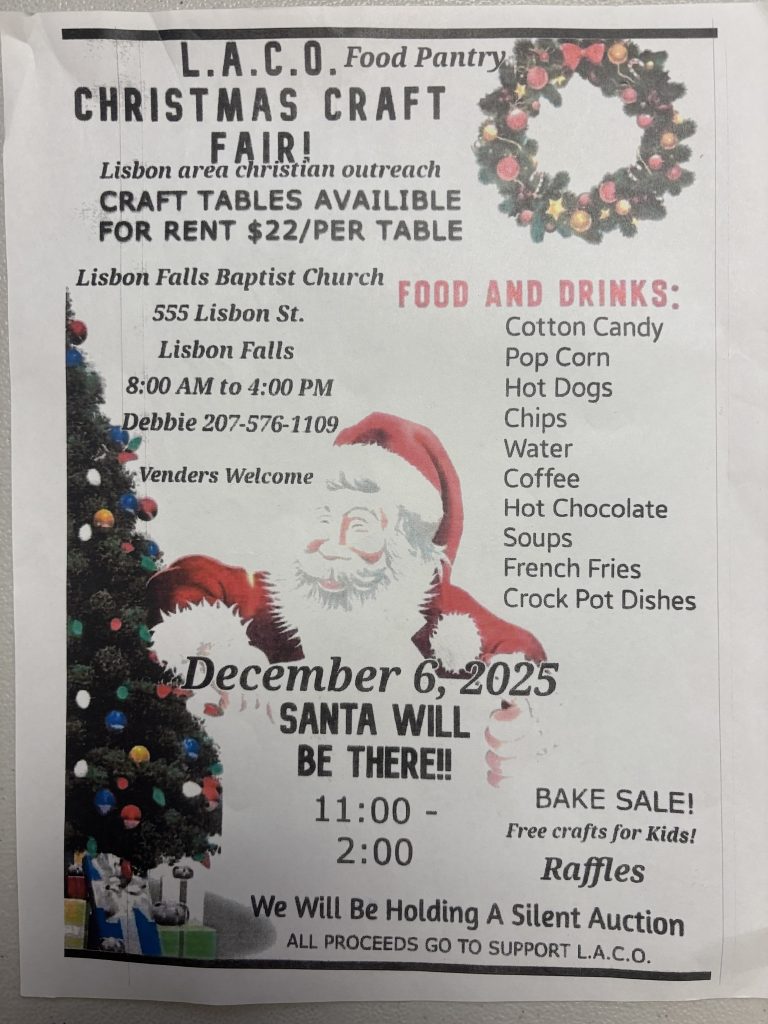
Agenda and Materials for November 16, 2025 Business Meeting
The agenda and materials for the November 16, 2025 business meeting of Durham Friends is HERE.
Durham Monthly Meeting of Friends
Agenda – November 16, 2025
Clerk: Ingrid Chalufour
- Approval of October Minutes
- Ministry and Council Report
- Finance Committee Report
- Nominating Committee Report
- Peace & Social Concerns Report
Where to Send Money to Aid Immigrants and Refugees
On November 9, we sent out a Friends Note seeking monetary assistance for legal costs in aid of two migrants (Miguel and Patricio) who had been seized by ICE. Haven Immigration Law has filed habeas corpus petitions on their behalf, but funds are needed to pay for this legal assistance. Money can be sent via Venmo to Christine Livia@steeny-bean, or to one of the four organizations below. (NB: links need to be retyped.)
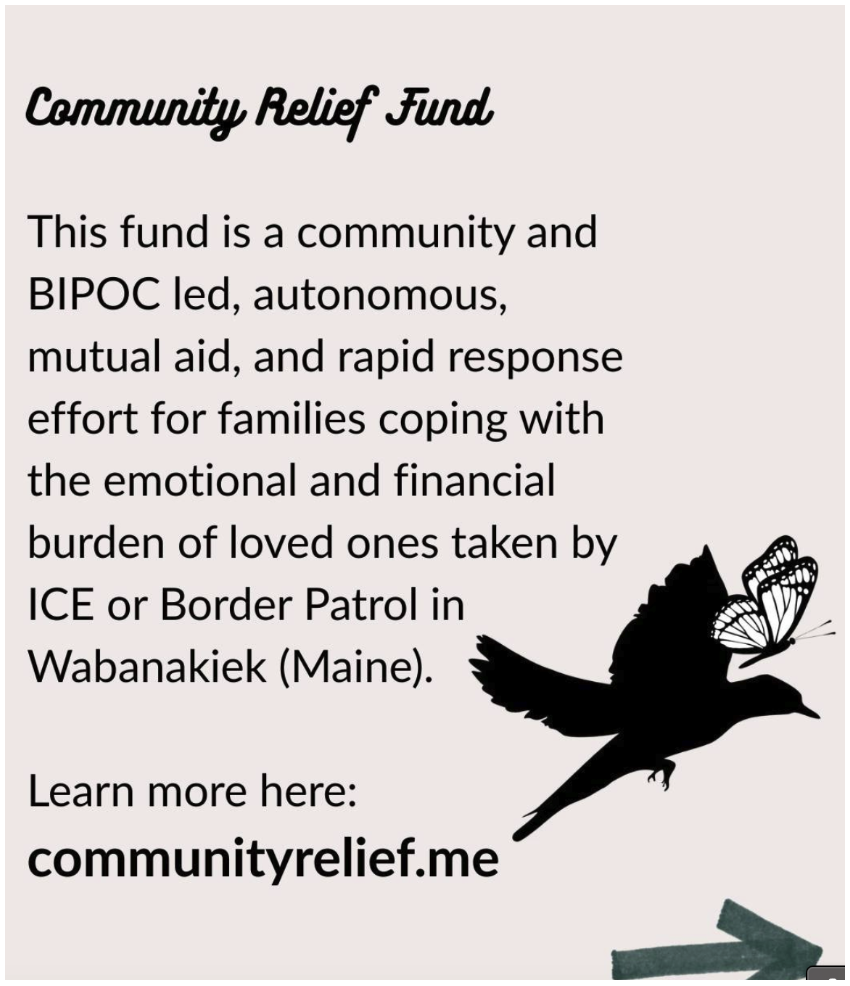
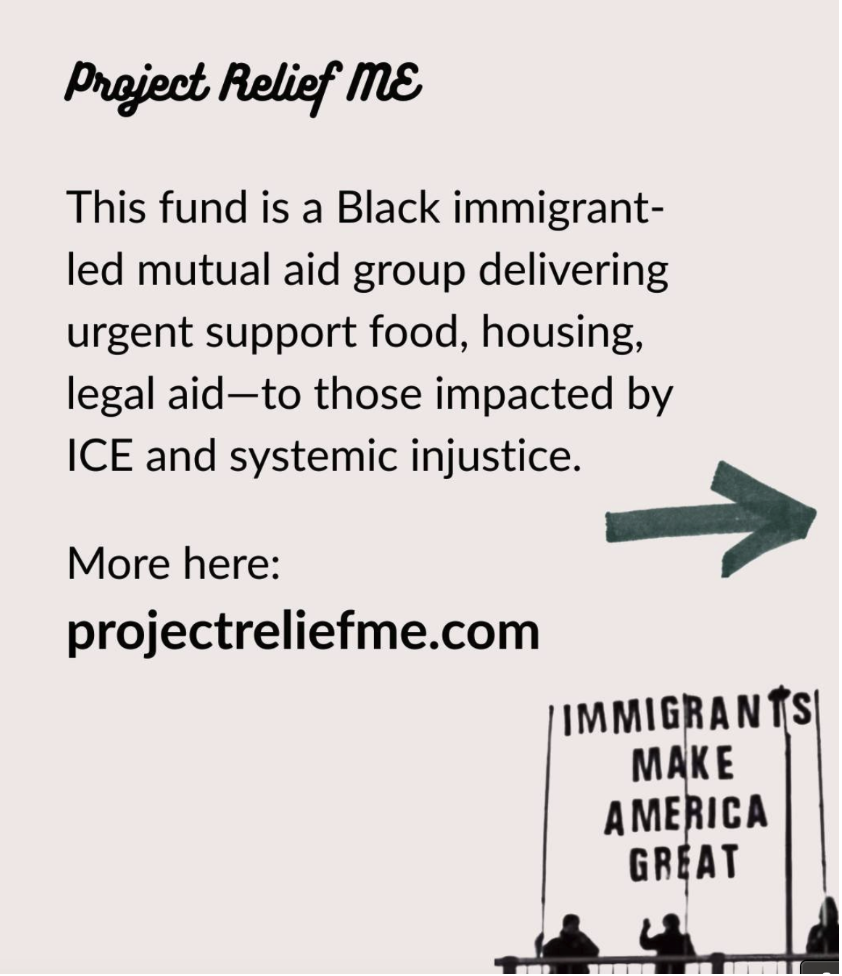
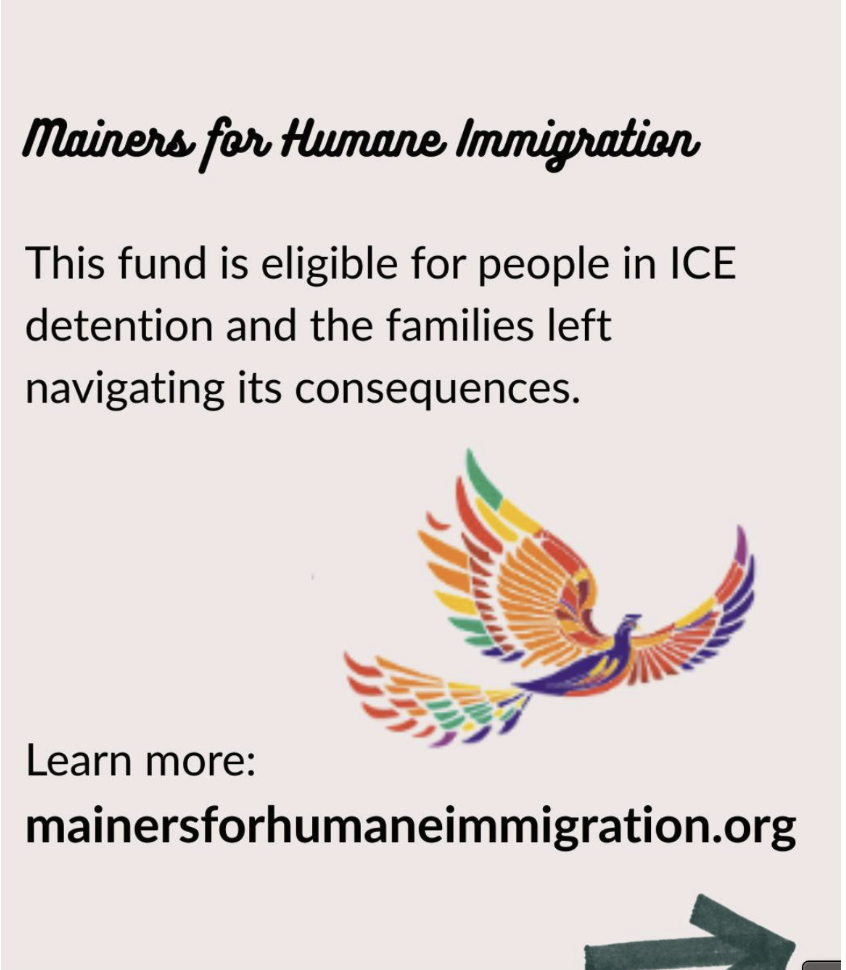
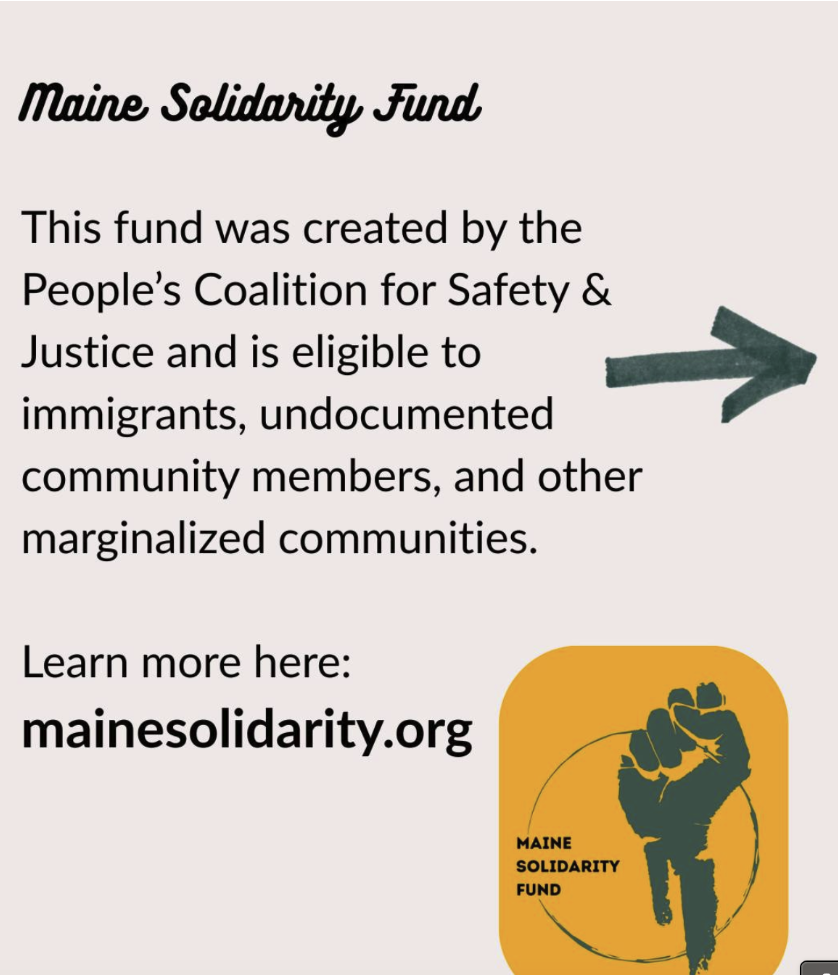
Maker Cafe, November 20, 2025, 5:30 to 8:00 pm
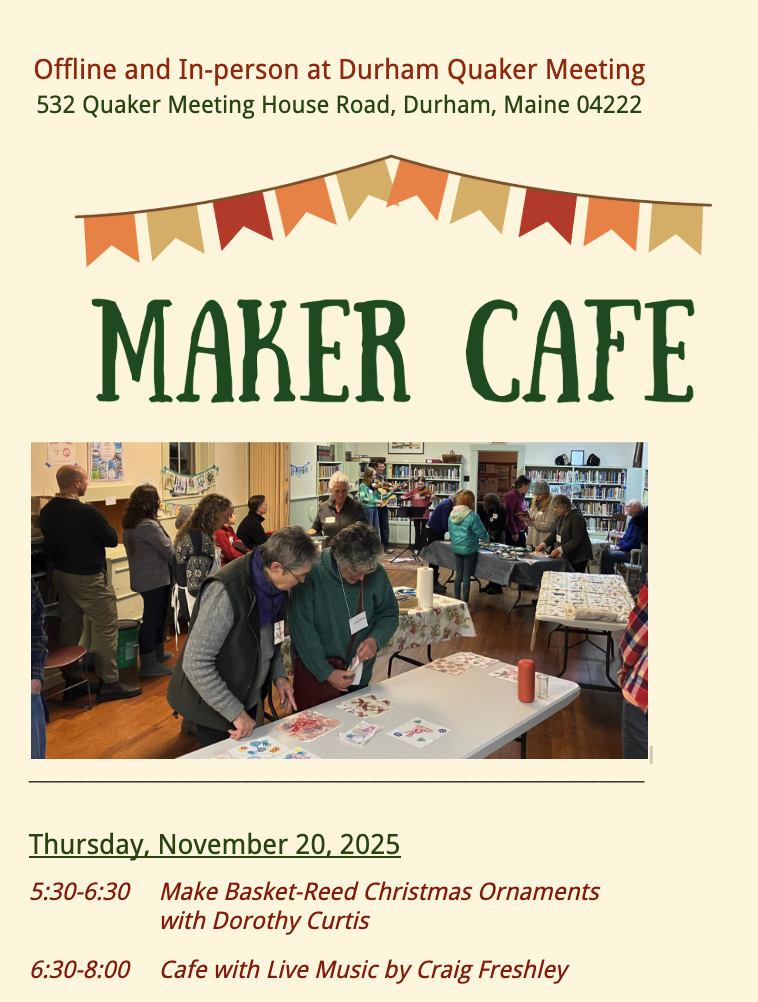
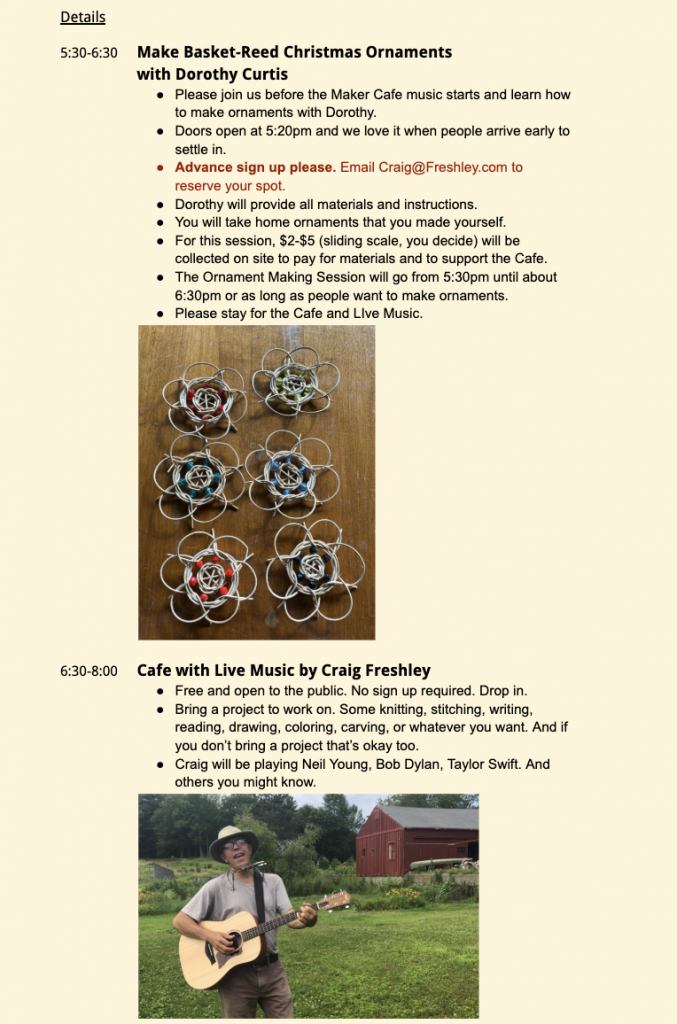
Woman’s Society Meeting Minutes, October 20, 2025
The Durham Friends Woman’s Society met on October 20, 2025 for a hybrid meeting.
Present: Dorothy Curtis, Nancy Marstaller, Susan Gilbert, Sarah Sprogell, Joyce Gibson, Qat Langlier, Dorothy Hinshaw.
Cards: For Friends.
Program and Devotions: We took turns reading from the new Blueprints: “Kindness the Action of Love” by Shelly Kirby. Scripture: Proverbs 31:26. Hymn “Love Lifted Me”. The author, a member of Archdale, NC Friends Quaker Meeting wrote of a dear elder Friend, Miss Florence, who in her long life treated everyone with kindness. Her family decorated the Meeting House for Christmas over the years. She loved and cared for family, friends and church community, in all things with loving kindness. We discussed our sense of the importance of loving kindness in our Meeting and lives.
Treasurer’s Report: Nancy said we received $20 for memberships and $10 toward Blueprints. She paid $70 to the USFW-NE for members (7). Our current balance is $301.95, including the $281.75 for LACO, donations from jam made by Dorothy Curtis.
Minutes: Nancy read her 9.15.2025 minutes.
Tedford Meal: The Oct. 6 Tedford meal was nachos, chili, savory corn pudding, chocolate zucchini cake, oranges, milk and cider. Durham Friends provide dinner for Tedford House on the first Monday of each month. The Nov. 3 Tedford meal Team F leader is Leslie Manning, (207)319-0342. Contributions of prepared food or money for Tedford meals are always welcome.
Next Meeting: November 17, 7 PM at Nancy Marstaller’s home.
Other Business:
* Silent Auction in November – Items and Bidders Needed *
The Woman’s Society will hold a silent auction the last three Sundays in November. Proceeds will go to Tedford Housing and the Warm Thy Neighbor programs.
Dorothy closed the meeting with words of Thomas A Kempis:
Have confidence in God’s mercy, for when you think . He is a long way from you, He is…near.
Respectfully Submitted, Susan Gilbert
Durham Friends Meeting Minutes, October 19, 2025
Durham Monthly Meeting of Friends Business Meeting Minutes, October 19, 2025
Ellen Bennett — Recording Clerk
Durham Monthly Meeting of Friends met for the conduct of business on Sunday, October 19, 2025, with twelve people in attendance at the Meetinghouse and two by Zoom.
1. Meeting Opening
Clerk opened with reading from Thomas Kelly’s A Testament of Devotion.
“There is a way of ordering our mental life on more than one level at once. On one level we may be thinking, discussing, seeing, calculating, meeting all the demands of external affairs. But deep within, behind the scenes, at a profounder level, we may also be in prayer and adoration, song and worship and a gentle receptiveness to divine breathings.
“The secular world of today values and cultivates only the first level, assured that there is where the real business of mankind is done, and scorns, or smiles in tolerant amusement, at the cultivation of the second level — a luxury enterprise, a vestige of superstition, an occupation for special temperaments. But in a deeply religious culture men know that the deep level of prayer and of divine attendance is the most important thing in the world. It is at this deep level that the real business of life is determined. The secular mind is an abbreviated, fragmentary mind, building only upon a part of man’s nature and neglecting a part — the most glorious part — of man’s nature, powers, and resources. The religious mind involves the whole of man, embraces his relations with time within their true ground and sitting in the Eternal Lover. It ever keeps close to the fountains of divine creativity. In lowliness it knows joys and stabilities, peace and assurances, that are utterly incomprehensible to the secular mind. It lives in resources and powers that make individuals radiant and triumphant, groups tolerant and bonded together in mutual concern, and is bestirred to an outward life of unremitting labor. ”
2. Approval of Minutes of September 2025
The Meeting approved the Minutes of the September 21, 2025 Business Meeting
3. Trustees Report — Sarah Sprogell
Please see report. The Meeting affirmed its gratitude for the work of Trustees.
4. Ministry and Counsel — Renee Cote
Please see report.
Renee Cote, Doug Bennett and Sarah Sprogell will be the representatives of Durham Friends at Quarterly Meeting on Saturday, October 25, which will take place in the Durham Friends Meetinghouse.
The recommendation was made that the Meeting Care Coordinator (MCC) be funded through 2026, and that Leslie Manning continue in the position.
Meeting approved continuing the MCC position through 2026.
Meeting approved Leslie Manning as the MCC position through 2026.
Note that the 5th Sunday in November is the first Sunday in Advent. Therefore, we will be having a programmed Meeting for Worship.
5. Woman’s Society — Dorothy Curtis
No report.
6. Peace & Social Concerns — Ingrid Chalufour
No report.
7. Finance Committee Report — Nancy Marstaller
No report.
8. Other business
Would anyone be led to form an ad hoc choir for Christmas-time? The annual Christmas program will be Sunday, December 21st. There was much enthusiasm for this idea, and two names came up as possible choir conductors/organizers.
Discussion ensued about placement of the projector and computer for the Zoom setup. Suggestions for improvements will be brought to Ministry and Counsel.
9. Meeting Closing
Business Meeting was adjourned with appreciation for everyone’s input and the beautiful fall day.
Respectfully Submitted, Ellen Bennett, Recording Clerk
November 2025 Durham Friends Meeting Newsletter
NEYM Epistles 2025
Israel-Palestine Letter from NEYM Clerks, October 2025
Acting on the request of New England Yearly Meeting Sessions 2025, a called meeting of New England Friends, convened by the Permanent Board, was held on October 18, 2025 to seek where we were led to act on the ongoing crisis in Palestine and Israel. The full minutes of the meeting can be found here. The deep and rich worship of those gathered at that meeting led us to find unity on a minute of actions and queries (see Minute 25-*1). While it cannot be expected that we all act on every one of the nine points in this minute, I ask that you bring this minute to your monthly meeting and consider which actions speak to your meeting and find ways to bring them alive. A minute is just words on paper until we bring them to life.
The gathered meeting found unity to endorse the Joint Quaker Organizations Statement on genocide in Gaza; a powerful statement that calls on its signatories and countries world-wide to take steps that will end the cycle of violence and violations of human rights in Israel and Palestine. By joining with many other Quaker bodies, we bring a united voice saying, “We hold in the Light all suffering peoples and leaders, praying they choose justice. In
Palestine and Israel, peace built on equality is the only path forward.” (see Minute 25-*2)
The final minute of the called meeting charged the Presiding Clerk, the Clerk of Permanent Board and the Israel-Palestine Resource Group to convene to explore, in consultation with those with experience in the region and who could provide context on the ground, the idea of sending witnesses to Gaza from the Yearly Meeting (see Minute 25-*3). After this consideration, this group will bring a recommendation forward to Permanent Board for their discernment. Details and advance documents for the Permanent Board meeting will be posted here when available.
Yours in peace, Phillip Veatch, presiding clerk; Susan Davies, clerk, Permanent Board
Minute 25-*1 from Called Meeting on Gaza held October 18, 2025
1. Engage with the AFSC Palestinian Program in their Fall 2025 efforts: Read, Mourn, Learn and Act; and consider taking up steps in the program in your monthly meeting.
https://afsc.org/news/6-ways-you-can-support-palestinians-gaza
2. Support Jewish neighbors
These two years have been deeply challenging in the Jewish Community. Jewish Voice for Peace (JVP) is an incredible organization, but for years it has been demonized by APAIC (the American Israel Public Affairs Committee )and others, so it isn’t always easy to turn to. There are increasing numbers of individuals who are horrified by what is being done supposedly in their name. It can be incredibly hard to speak up, but it is happening. How do we as individuals reach out to these folks and help them find their voices? What support do they need?
How do we support our Jewish neighbors who are targets of antisemitic actions? How can meetings and individuals reach out to Jewish communities and be clear of our support for their human rights and dignity regardless of political affinities?
3. Learn more about tax resistance and how to support those making this choice.
Next conference is November 7–9, 2025 at Worcester Friends Meetinghouse
4. Support those in or considering military service who struggle with conscience
5. Travel to the area and bear witness to the suffering. Contact us at https://neym.org/israel-palestine-resource-group to connect with those who have.
6. Provide financial support for the relief of suffering:
Palestinian Children’s Relief Fund, https://www.pcrf.net/
AFSC Gaza relief https://afsc.org/news/afscs-gaza-emergency-relief
Support Ramallah Friends School in the West Bank, which lost US AID funding:
7. Invite your Meeting to hold this discussion:
Peace and Reconciliation
Do you “live in the virtue of that life and power that takes away the occasion of all wars”?
Do you faithfully maintain Friends’ testimony against military preparations and all participation in war, as inconsistent with the teachings and spirit of Christ?
Do you strive to increase understanding and use of nonviolent methods of resolving conflicts?
Do you take your part in the ministry of reconciliation between individuals, groups, and nations?
When discouraged, do you remember that Jesus said, “Peace is my parting gift to you, my own peace, such the world cannot give. Set your troubled hearts at rest, and banish your fears”? John 14:27 NEB
(NEYM 1985 Faith and Practice, Query 12)
8. Discussion of Britain Yearly Meeting’s Statement on Genocide in Gaza
Adapted for United States Friends by Quakers for Peace:
9. And, finally, how do we hold ourselves accountable? Can the Israel Palestine Resource Group assist Meetings and Quarters in discerning what is ours to do?
Friends approved this minute.
Minute 25-*2 from Called Meeting on Gaza held October 18, 2025
The clerk asked if the body gathered was comfortable having the Presiding Clerk and the Yearly Meeting Secretary endorse the AFSC statement, mindful of the Policy on Public Statements (2015-57). “Quakers discern genocide is occurring in Gaza and urge courageous action.”
Friends approved this minute.
Maker Cafe, Thursday November November 20, 2025
Thursday, November 20, 2025
5:30-7:00 Make Basket-Weave Christmas Ornaments with Dorothy Curtis
Advance sign-up required. Details forthcoming.
6:30-8:00 Cafe with Live Music by Craig Freshley
Drop in. No sign-up. All welcome. Details forthcoming.
Future Maker Cafes:
- December 18
- January 22
- February 19
- March 19
NEYM to Hold Workshops on Meeting Care Day, November 15, Bedford, MA
NEYM will hold a series of workshops on November 15, 2025, 9:00 to 3:00, that may be of interest to Friends. Schedule of the day and additional information below
Location
First Parish Church
75 Great Rd
Bedford, MA 01730
United States
Here is the list of workshops to be held:
| Quaker Group Discernment: Clerking, Recording, and Active Participation Great for: New and experienced committee, board, or meeting clerks. New and experience committee, board, or meeting recording clerks. Any Friend who wants to develop & deepen their understanding & skills in discernment and Quaker process. |
| Best Practices in Nominating Great for: Friends serving on nominating committeesAnyone who yearns to draw out gifts and grow leadership in our Quaker communitiesFriends with a concern for healthy relationships and healthy functioning in our Quaker meetings. |
| Setting the Table for Newcomers Great for: Friends looking to share and hear ideas related to outreach Friends working to create a culture of welcome in their meeting. Friends concerned for connecting seekers and new Quakers with adult religious education opportunitiesFriends passionate about working towards a healthy future for our meetings. |
| Emerging Conversations About Ministry and Eldership in Our Meetings Great for: Friends serving on Ministry & Counsel (or similar role) in their meeting. Any Friends seeking to enrich the spiritual life at their meetingFriends bringing questions, resources, or experiences to share related to ministry and eldership in meetings. |
Details
Do you serve your local Quaker meeting? Are you looking to connect with others serving in similar roles to discuss challenges and explore best practices? Join us for Meeting Care Day, an in-person event featuring multiple workshop options related to specific service areas. Before and after the morning and afternoon workshop sessions, we will gather for worship and fellowship, making for an energizing day.
Schedule
- 9:00 Arrivals, fellowship, coffee & refreshments
- 9:30 Welcome & opening worship
- 10:15 Part one workshops
- 11:45 Lunch (bring your own)
- 12:45 Part two of workshops
- 2:15 break
- 2:30 Closing worship
- 3:00 Goodbyes
Workshops
All workshops are three hours, broken into two 90-minute sessions. Participants choose one workshop to participate in throughout the day. This year, participants can choose from one of four workshops:
Best Practices in Nominating
Nominating is an essential way we draw out gifts and grow leadership in our Quaker communities. Nominators sit at the intersection of the meeting’s needs and individual spiritual journeys. This work is deeply relationship-based and involves seeing the “big picture” of our ever-evolving meeting communities as well as the details involved in getting various tasks done. In many of our meetings, nominators quietly and lovingly engage in the one-on-one conversations that help our meetings thrive. This workshop, which will be of special interest to Friends serving on nominating committees, will provide a place to share best practices and unpack challenges in nominating. Facilitated by Lucy Meadows (Beacon Hill) and Jackie Stillwell (Monadnock).
Quaker Group Discernment: Clerking, Recording, and Active Participation
Join New England Friends’ new Presiding Clerk Phillip Veatch (Fresh Pond) and other Friends to develop and deepen skills in Quaker group discernment and decision-making processes used in our meetings, organizations, and committees including the particular functions of clerk and recording clerk. This workshop is designed to be of use to both those new to and experienced with Friends’ practices. Whether you are currently serving as clerk or recording clerk in a local meeting or on a committee or you are hoping to strengthen your participation in discernment outside a particular role, you are welcome.
Emerging Conversations About Ministry and Eldership in Our Meetings
What conversations regarding ministry and eldership are happening (or not happening) in our meetings? What guidance, practices, and resources are Friends able to offer one another in seeking to enrich the spiritual life within our meetings? What new challenges and opportunities are emerging, as we live into these unsettled times? Whether you serve on your meeting’s Ministry & Counsel committee or otherwise hold a concern for the spiritual health of your meeting, we invite you to join an exploratory conversation and resource-sharing opportunity. Facilitated by Janet Hough (Cobscook), clerk, NEYM Ministry & Counsel.
Setting the Table for Newcomers
In each of our local communities, there are spiritually hungry seekers yearning to connect. How can we extend a living invitation and set the table to feed newcomers and long-time Friends alike? Join us for a conversation about outreach, welcome, religious education, building belonging, renewal, and change in our Friends communities. Conversation starters will include Emily Mason who followed a leading to begin the Orchard Hill Worship Group in New Hampshire and Phil Fitz who was led to develop the Elements of Quakerism course to move Friends past Quakerism 101 in his home meeting in Northampton, MA and beyond, and Regina McCarthy who has been a part of Wellesley Meeting’s varied efforts to welcome newcomers and families. Facilitated by Program Director Nia Thomas (Northampton).
Ready to register? Go here.
Questions or suggestions? Contact Program Director Nia Thomas.
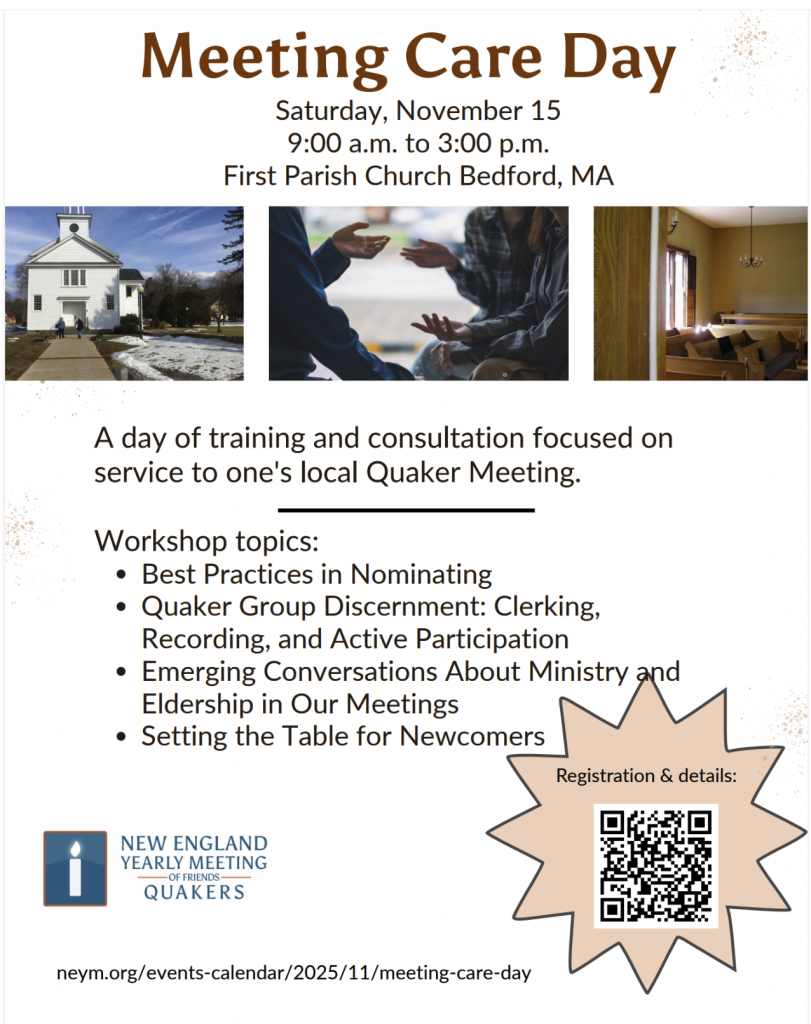
P&SC Urges Extra Support for Local Food Banks
Peace and Social Concerns Committee would like to call our attention to the emerging food crisis with the interruption of SNAP benefits during the federal government shutdown. P&SC urges DFM folks to be especially generous in contributions to local food banks and pantries.
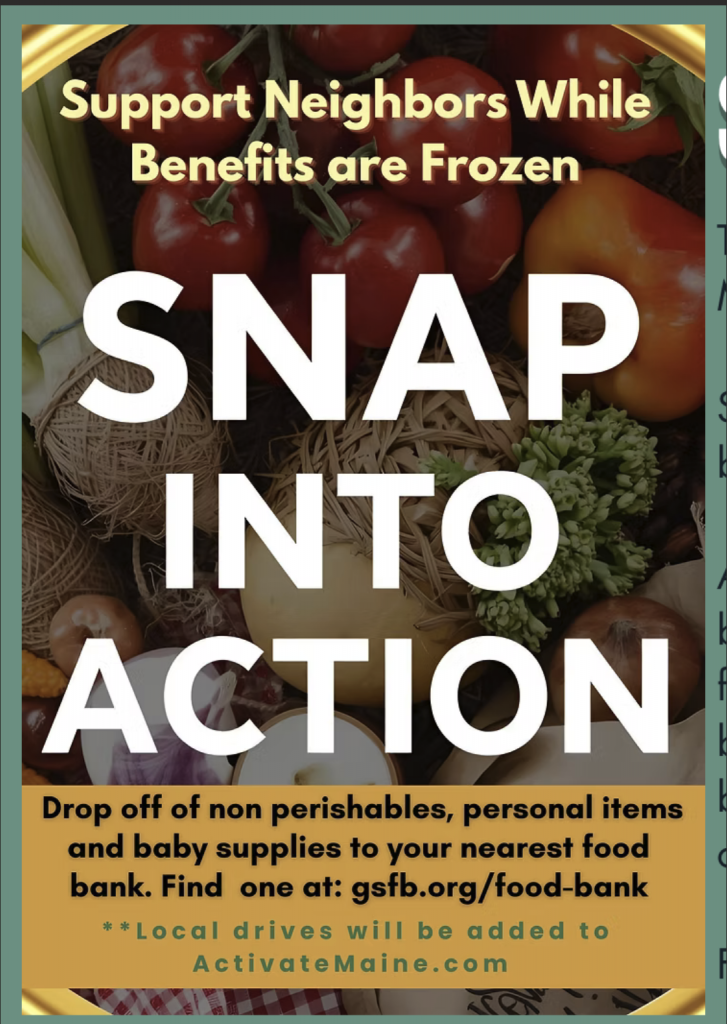
Here’s a statewide initiative to support food banks.
Financial Problems at Friends United Meeting (FUM)
A few days ago, Friends United Meeting sent out the following sad story. If you are not familiar with FUM, you can learn more HERE. New England Yearly Meeting (to which Durham Friends belongs) is itself oner of the member Yearly Meetings of FUM.
 |
October 23, 2025 The North American and Caribbean Board of Friends United Meeting write: The North American and Caribbean Board of Friends United Meeting write:Dear Friends, We will put the bad news first: at our current income and expenditure rate, FUM will not have sufficient operating funds to remain open by July of 2026.We understand that this may come as shocking news, and we’re taking some actions to improve the situation. Keep reading to learn more.The Board has been aware of the magnitude of our financial crisis for several months now; in late spring, we were startled to learn that we were not certain we would make payroll. Rather than release bad news in a piecemeal fashion, we took some time to fully understand the problem. We assessed all our various forms of income and expenditures, looked at historical trends to understand how much of our current situation is temporary and how much is an ongoing problem, asked Lloyd Stangeland of Iowa Yearly Meeting to serve as our temporary CFO, and worked to reconcile bookkeeping errors.Over time, overall giving to FUM has risen—especially for designated ministry work. What has not kept pace is support for the Ministry Support Fund, which covers the administrative expenses of FUM’s work. While most of our individual ministries have sufficient funding for themselves, for the past several months our administrative expenses have exceeded income by an average of about $34,000 a month. In the past twenty years, contributions from Yearly Meetings that funded our administrative work have decreased significantly. Individual donations have risen, but not quickly enough to make up the difference. The costs of doing our work have risen tremendously. We also experienced unexpected complications with a transfer between bookkeeping systems, which obscured the seriousness of our financial predicament.We, the Board, are profoundly sorry to Friends for the role our own inaction has played in this crisis. Our audits have not been done in a timely fashion, internal financial controls have been missing, and we did not ensure that good accounting practices were being followed. We have not been careful enough in reviewing financial information given to us or in developing the ability of new board members to understand FUM’s complex financial structure. In response to this crisis, we are taking several steps… Read the rest of the letter from the Board here (link opens as a PDF). If you have questions, you can use the Contact List below to get in touch with your representatives or other members of the Board. The Board is meeting in a called session on Friday, October 24th, to consider the Fiscal Year 2026 budget. Please pray that Board members will be open to hearing God’s wisdom and able to hear how the Spirit is calling Friends forward.In Peace, Sarah Lookabill Presiding Clerk of the Friends United Meeting Board |
Resource Documents (links open as PDFs): Further Financial Information North American and Caribbean Board Contact List Copyright © 2025 Friends United Meeting, All rights reserved. Copyright © 2025 Friends United Meeting, All rights reserved. |
Introduction to Quakerism begins November 9
From Ministry and Counsel:
On November 9 we will begin our adult education program with an introduction to
Quakerism.
The sessions will be held on the second and fourth Sundays from 9:30 to 10:15 from
November through March, both in the meetinghouse and on Zoom. Leslie and Joyce will be the
initial facilitators. After the first session we will focus on the Quaker testimonies as presented in
Faith and Practice, with sharing about how particular testimonies have influenced us.
What We Do, We Do Together
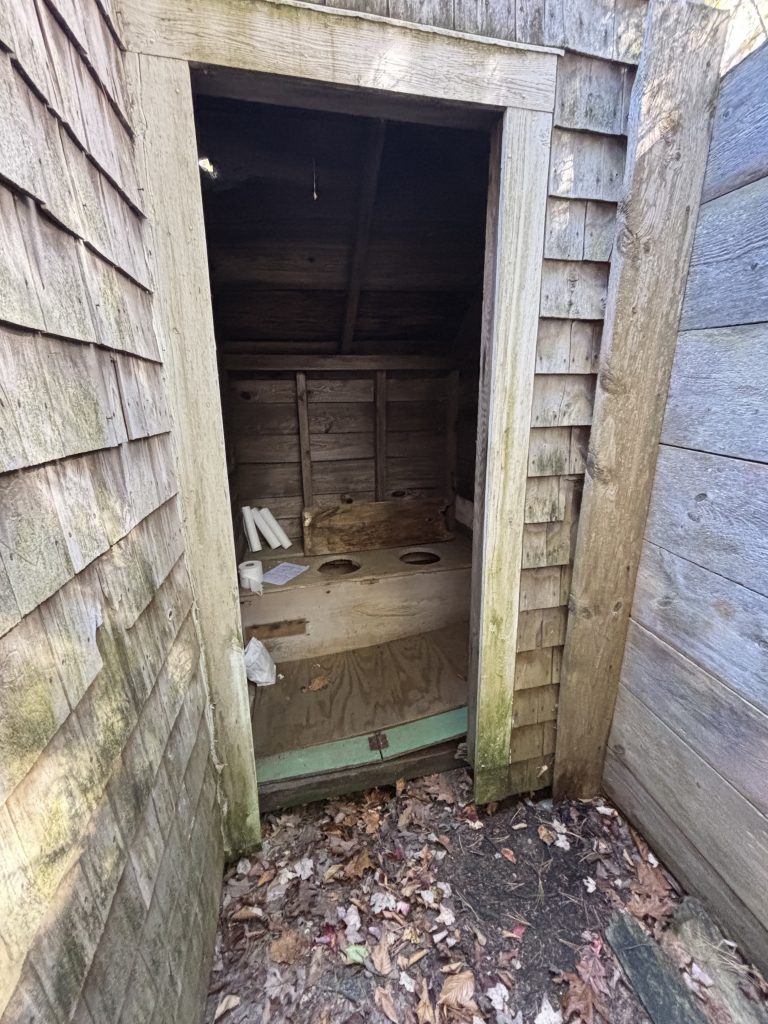
The old two-holer at the end of the horse shed. It needed to be available the day we celebrated the 250th because our well pump had failed, disabling the indoor plumbing.
Agenda and Materials for October 19, 2025 Business Meeting
The reports and other materials for the October 19, 2025 DMM Business Meeting are HERE.
Durham Monthly Meeting Agenda, October 19, 2025
1. Approval of September minutes
2. Trustees
3. Ministry and Counsel
4. Woman’s Society
5. Peace and Social Concerns
6. Finance
7. Other business
Falmouth Quarter to Meet October 25, 2025, 9:30 to 3:30
Falmouth Quarter will meet on October 25th from 9:30 – 3:30 at Durham Meeting Meeting (or by zoom, link password 1775). We invite you to come and share about the life and spirit in your meetings. Our hope is that our entire time together is a time of worship, with laughter, business, connections and fellowship. All are welcome.
We invite you to come and share about the life and spirit in your meetings. Our hope is that our entire time together is a time of worship, with laughter, business, connections and fellowship. All are welcome.
The schedule for our time together is:
· 9:30 gather
· 10:00 Meeting for business – agenda at end of this announcement
· 12:00 break, brown bag lunch – there is a stove, microwave and tea kettle in the kitchen.
· 1:00 Afternoon program:
Description of the afternoon program:
“Rekindle the gift of God that is in you… for God did not give us a spirit of fear, but of power, love, and self-control” (2 Tim 1:6-7). “Behold I will do a new thing” Isaiah 43:19
We are living in different times, do we have the what we need now? How can we find our spiritual bearings in the face of the institutional cruelty locally, nationally and internationally? What is the Truth that is needed now and how do we tell it’s story?
We will listen to the story as told in Isaiah that the community learned to tell during the exile in Babylon, and listen to the story told in Ramallah by Jean Zaru in the present time.
Through their stories, we expect to begin to find new threads of Truth that speaks to our current condition — the story that we need today. A story that equips, empowers and encourages us.
Agenda for business meeting:
· One of the essential responsibilities of a Quarter is to pay attention to and nurture the spiritual health, experience and ministry in the monthly meetings of the Quarter. Please come prepared to share about the life of your meeting.
· Report from Annual Sessions –
o The concern brought by Falmouth Quarter about supporting LGBTQAI+ communities and especially Transgendered folks.
o Our experience of the bible half hours brought by Kirenia Criado Perez
o Other
· Treasurers report, approving the budget, approving donations.
· Approving the Quaker representative to the Maine Council of Churches.
· Approving the dates and suggesting topics for Quarterly meetings for the coming year.
Maker Cafe, Thursday, October 16, 2025
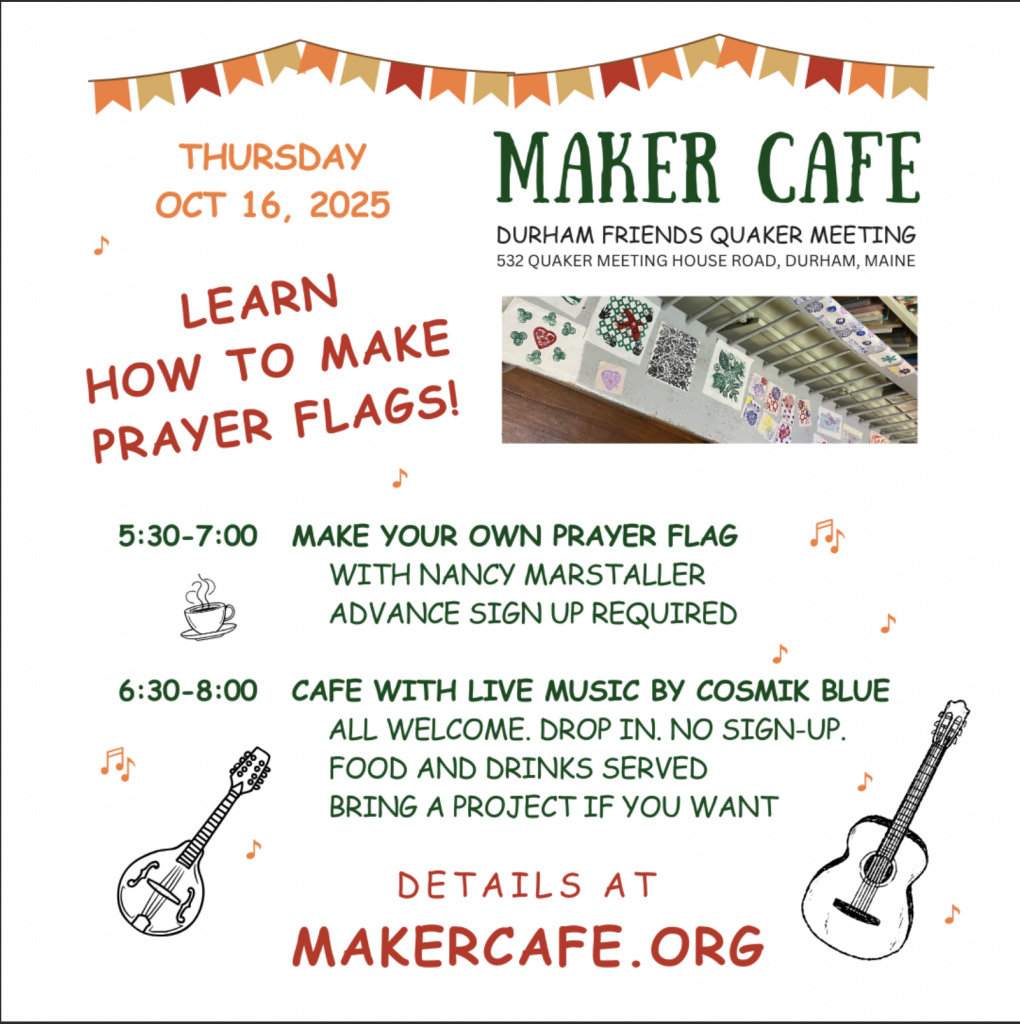

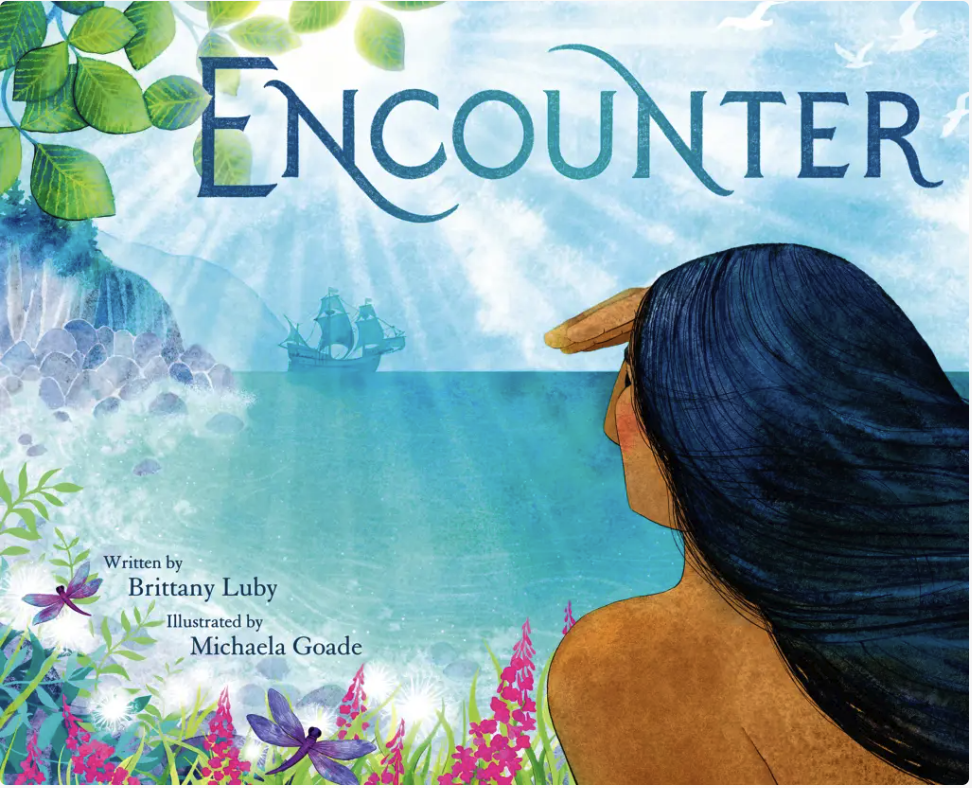
 Another person who offers me wisdom and hope is a Penobscot leader and activist, Sherri Mitchell. I heard her speak right after the election about feeling hope that we’ll finally realize that building community is paramount to saving the earth and each other.
Another person who offers me wisdom and hope is a Penobscot leader and activist, Sherri Mitchell. I heard her speak right after the election about feeling hope that we’ll finally realize that building community is paramount to saving the earth and each other.